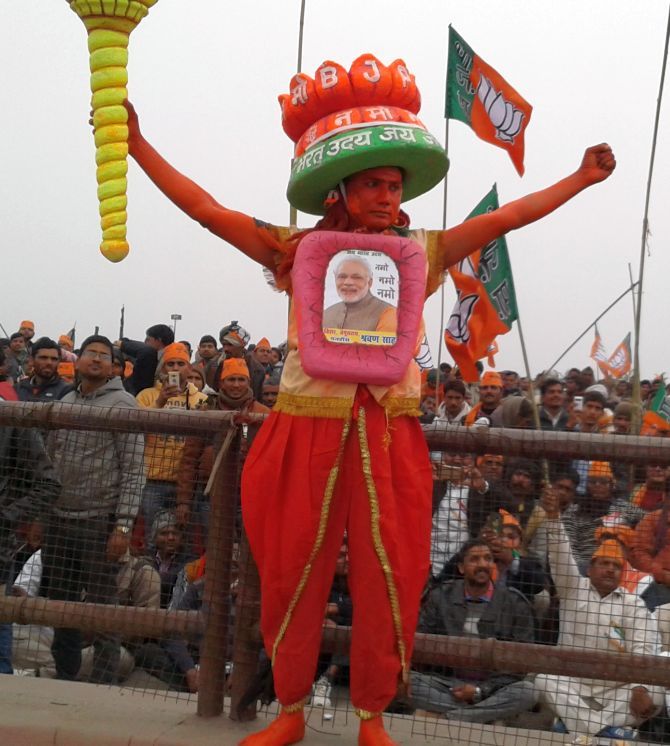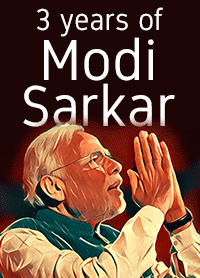'The BJP has latched on to the idea of nationalism, but the nationalism they advocate is not nationalism as we have understood it since the time of the freedom movement.'
'This is not secular nationalism, it is Hindu nationalism.'
'It is a form of nationalism that is exclusionary and it tends to conflate national interest with the government.'
'So, if you disagree with the government, for example, on surgical strikes or demonetisation, you are anti-national or holder of black money.'

Zoya Hasan, Professor Emerita, Centre for Political Studies at Jawaharlal Nehru University, is one of India's leading political thinkers.
Rediff.com's Shobha Warrier spoke to Professor Hasan about what Narendra Modi has achieved in the three years he has been in power.
Several surveys say that by and large, the people of India are satisfied with Prime Minister Narendra Modi though they are worried about unemployment and price rise.
Why is it that despite these two huge issues, people feel satisfied with his governance?
It is clear that Narendra Modi is a popular leader which is evident from the UP election result.
The BJP won a spectacular victory in the state assembly election under his leadership and even won local elections in Delhi in his name.
There are several different reasons for this:
It is the BJP's stunning success in UP that has reinforced his larger than life image.
Another reason for this is the nature of the BJP-RSS combine.
Apart from everything else, it is a relentless electoral machine. They are focussed on elections and winning power at any cost.
No party can match up to the RSS which provides support to the BJP in election engineering, propaganda, mobilisation and booth management.
By contrast, the Congress, the principal Opposition party, is a depleted organisation with no cadres or activists.
Not just the Congress, no political party has this kind of support structure.
Fragmentation and division of the Opposition has been an important factor aiding the BJP's electoral triumph in state after state.
There is no national level leader in the Opposition who can take on Narendra Modi.
Till 2014, the BJP-RSS combine was not successful. What changed after 2014?
The BJP has been in power for three years. That helps the ruling party in setting the agenda and mobilising support on the basis of its policies and performance.
Recent opinion polls show that people are satisfied with the prime minister and the government's performance.
Right now no leader can match the stature and charisma of Narendra Modi.
He is seen by people as a decisive leader, who is a doer and can take tough decisions.
Then, there is a sustained propaganda behind all of this.
This government is very effective when it comes to communication its ideology and achievements.
It was the opposite with the UPA government which failed to communicate with the public.
Also, let's face it there is a certain degree of Hinduisation that is happening in our society.
A large number of people see this government as one which will protect their interests and therefore support it.
The Opposition is decimated.
At the same time, in UP, the BJP won 325 seats with roughly 40 per cent of the votes.
It means almost 60 per cent of the people did not vote for the BJP in UP.
Likewise, in 2014, the BJP won an absolute majority with 31 per cent of the votes.
The Opposition has the requisite vote to put up a challenge if they are united.
You spoke of the BJP getting just 40 per cent of the votes and getting more than 300 seats. Some say this is because of the polarisation that is happening in society. Do you feel so?
Yes, a division and polarisation was taking place.
For example in a state like UP, polarisation was actively fuelled by communal appeals with Narendra Modi taking the lead in stoking the feeling of discrimination against Hindus pushing in the process a shift towards majoritarian consolidation.
But it's not just communal polarisation, but a combination of polarisation and development.
It is not overt communalism or straightforward development promises or commitments.
It was both elements couched within a discourse of development.
In a surcharged political climate which existed in UP during the election, the campaign, the critical issue that turned the election was not the slogan of sab ka saath, sab ka vikas, but the prospect of development for certain groups cleverly articulated in the rhetoric of discrimination against none.

Is it only the perception of some people or, do you feel there is a hypocrisy behind the sab ka saath, sab ka vikas slogan?
In politics, perception matters.
Take, for example, demonetisation.
After six months, we still don't know how much black money made its way into the banks.
The prime minister put forward four major reasons for the shock move: Tackling black money, corruption, fake currency and terror financing.
But the decision was ineffective in meeting any of these goals.
The dramatic nature of the move evoked shock and awe as people were overwhelmed by the sheer boldness of the whole exercise.
Despite the economic dislocation and inconvenience caused by the disruptive decision of demonetisation, Modi convinced people that it was a well intentioned policy which was taken in the national interest and for the greater public good.
This was most evident in UP where voters seemed to connect to his political messaging and were more than willing to forgive the hardships inflicted on them by notebandi.
This is how perception works and people agree with his arguments.
Why do people believe what he says?
The Sangh Parivar consists of a phalanx of organisations and affiliates.
Some of these organisations are involved in mob lynching and so on. But the BJP can claim the party has nothing to do with it and people will believe them because their own members are not directly involved.
The Sangh Parivar has a perfect alibi to claim innocence.
People are willing to believe that these are isolated incidents and the BJP is not involved and it is some fringe elements who indulge in wrongdoing.
The BJP has changed the public discourse making it overtly nationalist marked by valorisation of the army and defence forces.
It has latched on to the idea of nationalism, but the nationalism they advocate is not nationalism as we have understood it since the time of the freedom movement.
This is not secular nationalism, it is Hindu nationalism.
It is a form of nationalism that is exclusionary and it tends to conflate national interest with the government.
So, if you disagree with the government, for example, on surgical strikes or demonetisation, you are anti-national or holder of black money.
Even on demonetisation the government took refuge in nationalism to deflect attention from the lack of economic logic, social consequences and long-term repercussions of the move.
The BJP has made deft use of the media.
What we are witnessing with the media is quite extraordinary.
The media is not performing its role of communicating reality. Instead, it is actually propagating the government's point of view and presenting it as national interest.
This is extraordinary because in most democracies the media is a watchdog of the government, but in India today the media is the watchdog of the Opposition.
The media has taken it upon itself to expose the Opposition.
This is particularly true of television which night after night is putting the spotlight on the Opposition.
They are not interrogating the government of the day. The media has completely abdicated its role of speaking truth to power.
This is not a healthy development for our democracy.
Wasn't the media, especially television, very pro-establishment earlier also?
When the UPA was in power, didn't we see the media attacking and questioning Narendra Modi and not those in power?
It was pro-establishment under earlier Congress regimes, but this tendency was not apparent during the UPA rule, and certainly not in the last three years of UPA-2 when the media went after the government.
The media today is unwilling to ask uncomfortable questions of the government.
When the UPA was in power, the media was playing its adversarial role to the hilt, whereas now it is interrogating the Opposition to the hilt.
Narendra Modi came to power on the plank of development. Though the Indian economy is growing at 7%, it is jobless growth.
Well, yes, growth has picked up, but in many respects the economy is not doing well.
Manufacturing has not taken off notwithstanding the Make in India campaign, investments are not happening in a big way, and the agrarian economy is under terrible stress.
The most important problem is jobs.
When the UPA was in power everyone said it was jobless growth, now it is worse.
Narendra Modi's biggest promise was the creation of new jobs during the 2014 election campaign.
The government promised 10 million jobs in 2 years, but it has fallen short, in fact, availability of jobs has been the lowest in the last two years.
So far, the government has not been held accountable for slow growth in jobs.
Will this not lead to social unrest?
People seem to be mesmerised by Narendra Modi.
They are in a trance. They are willing to believe that he is taking the country in the right direction.
But sooner or later, people will come out of this trance and start asking questions about delivery of promises.
They will ask where are the jobs?
When intellectuals question him, the people seem to support him.
That is true to some extent. But there is disquiet.
Everybody is not taken by the official narrative that the Modi government is the best thing that has happened to India in 70 years.
There are misgivings among ordinary people about social harmony and social peace which has not been a strong point of this government, fragility of the rule of law, inhumanity of cow vigilantism and so on.
Then there is the whole issue of intolerance that worries a lot of people, and not just the intellectuals.
In the first year of Narendra Modi, we heard a lot of people raising their voices against intolerance but we don't hear it anymore.
It is true that in most societies thousands of people would have taken to the streets to protest against vigilantism and mob lynching. But there is concern about growing intolerance in our country.
Yes, in 2015, writers, cultural artists and intellectuals raised their voice and we don't hear such protests now.
There is a decline of dissent. One wonders why this is so.
One reason could be that award wapsi was a protest stirred essentially by the assassination of rationalists. The situation is different now.
Protests have declined either because of fear or because people are not appalled at the turn of events.
So, you are quite right, we don't have many protests now and this raises serious questions about the nature of citizenship and the role of civil society in promoting it.
Contrast this with citizen protests in the US from the day of Donald Trump's inauguration. We are yet to see such protests in India three years after this government came to power.
That said, universities have emerged as the frontline for resistance and opposition.
This is why there is a sustained attack on universities, especially those institutions that encourage a spirit of critical enquiry.
The heartening thing is that the faculty and students are not taking attacks on academic autonomy, academic freedom and critical enquiry, lying down.
Look at the remarkable fight back in JNU against the attacks on the university and its autonomy.
Do you feel this government does not like anybody questioning it?
Well, Cabinet ministers are not falling over each other to welcome criticism and critical scrutiny.
This is because they are not exactly eager about pluralism and multiculturalism, they want 'one nation, one culture, one ideology.'
Do you think the minorities feel insecure since this government came to power?
Minorities definitely feel insecure because of the government's failure to act when they are targeted.
Majoritarianism has been on the rise, consequently, majority and minority identities have become more salient than equality before law or equal citizenship.
While Pehlu Khan, a dairy farmer, was lynched in Alwar because of his Muslim identity, non-Muslims in the same group were let off by the mob.
Clearly, if there is a dispute between identity and citizenship, identity is winning in the current atmosphere.
There is a deep sense of insecurity among Muslims and a feeling that they are being reduced to the status of second class citizens.
As an academician and as a person, what do you feel right now?
As an academic, what is disturbing is the government's anti-intellectual orientation and its attitude towards universities.
Look at the appointments they are making in universities and research institutions such as ICHR (the Indian Council of Historical Research) and ICSSR (the Indian Council for Social Science Research).
There is not much that will be left of these institutions at the end of the term of the present incumbents.
As a person, I am deeply concerned about the overall shift to the right in Indian politics and the shrinking space for liberal and progressive politics after the rise of the BJP.
As a citizen, one is concerned about the emergence of a highly centralised political system with the executive branch of government encroaching on almost all countervailing institutions, thus weakening established institutional structures and in the process undermining democracy as well.
Anything positive about the government?
After a long time, we have a stable, majority government led by a popular prime minister.
There are no mega corruption scams at the higher levels.
There is clarity about leadership while the major problem with the UPA was the absence of a clear leadership structure.
IMAGE: A Narendra Modi supporter at an election rally in Lucknow during the UP campaign. Photograph: Sandeep Pal.










